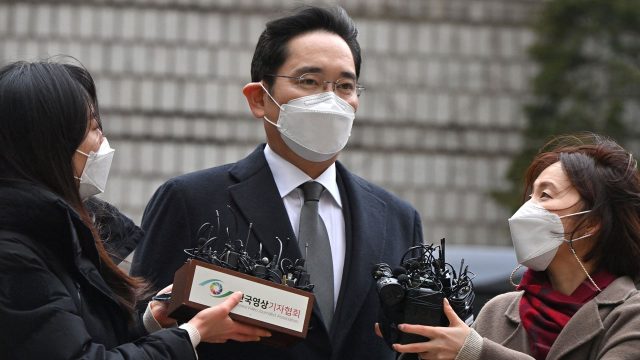By AFP
(FILES) This file photo taken on January 18, 2021 shows Lee Jae-yong (C), vice chairman of Samsung Electronics, arriving at a court for a trial in his bribery scandal involving former South Korean president Park Geun-hye in Seoul. – Lee Jae-yong, the jailed de facto leader of the giant Samsung group, will be released early on parole this week, South Korea’s justice ministry said on August 9, 2021. (Photo by Jung Yeon-je / AFP)
The jailed de facto leader of the giant Samsung group will be released early on parole this week, South Korea’s justice ministry said Monday, easing concerns over a possible leadership vacuum at the conglomerate.
Lee Jae-yong — the 188th richest person in the world according to Forbes, with a net worth of $12.4 billion — is currently serving a two-and-a-half year prison sentence for bribery, embezzlement and other offences in connection with the corruption scandal that brought down ex-South Korean president Park Geun-hye.
But calls for his early release from both politicians and business leaders have grown in recent months over concerns about the impact of the coronavirus pandemic on the South Korean economy, the 12th-largest in the world.
His freedom will ease concerns over decision-making at Samsung, by far the biggest of the family-controlled conglomerates, or chaebols, that dominate business in the country.
There is a long history of top chaebol figures being charged with bribery, embezzlement, tax evasion, or other offences.
But many of those convicted have subsequently had their sentences cut or suspended on appeal, with some receiving presidential pardons in recognition of their “contribution to the national economy”.
South Korea traditionally issues pardons around this time of the year as it celebrates Independence Day on August 15, and the justice ministry said this year 810 people had been approved for release on parole.
Justice Minister Park Beom-kye said Lee was “among those granted parole in consideration of the national economic situation due to the prolonged coronavirus pandemic”.
The decision was “based on various factors including public sentiment and his attitude in prison”, he told reporters.
Local reports said he was a “model prisoner” and this month a rule change came into effect cutting the proportion of the sentences prisoners must serve to be eligible for parole.
Lee, 52, just comes into compliance with the new requirement and will be released on Friday.
He was first jailed for five years in 2017, after Park’s ouster, then walked free the following year when an appeals court dismissed most of his bribery convictions and gave him a suspended sentence.
But the Supreme Court later ordered Lee to face a retrial, which convicted and jailed him again.
Even so, Monday’s parole announcement will not be the end of his legal travails: he is currently on trial on separate accusations of manipulating a takeover to smooth his succession at the top of the Samsung group — the same issue on which he was said to have sought help from Park.
Conglomerate delegation Monday’s announcement comes after five major South Korean business groups in April appealed to the presidential Blue House for a pardon for Lee on national economic grounds.
In June, leaders of the country’s top four conglomerates — SK Group, Hyundai Motor Group, LG Group and Samsung — also met with President Moon Jae-in to press him to pardon Lee.
Polls also show an increasing number of South Koreans supporting the idea of granting him parole, with more than 66 percent of respondents in favour in a recent Realmeter survey.
The turnover of the overall Samsung group is equivalent to a fifth of the national gross domestic product and it is crucial to South Korea’s economic health.
Analysts have warned the prolonged absence of its de facto leader could hamper its decision-making on future large-scale investments of the kind that have been instrumental to the rise of its flagship subsidiary Samsung Electronics to become one of the world’s top smartphone and computer chip makers.
Last month, Samsung Electronics recorded a more than 70 percent jump in second-quarter net profits.

